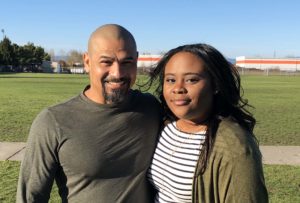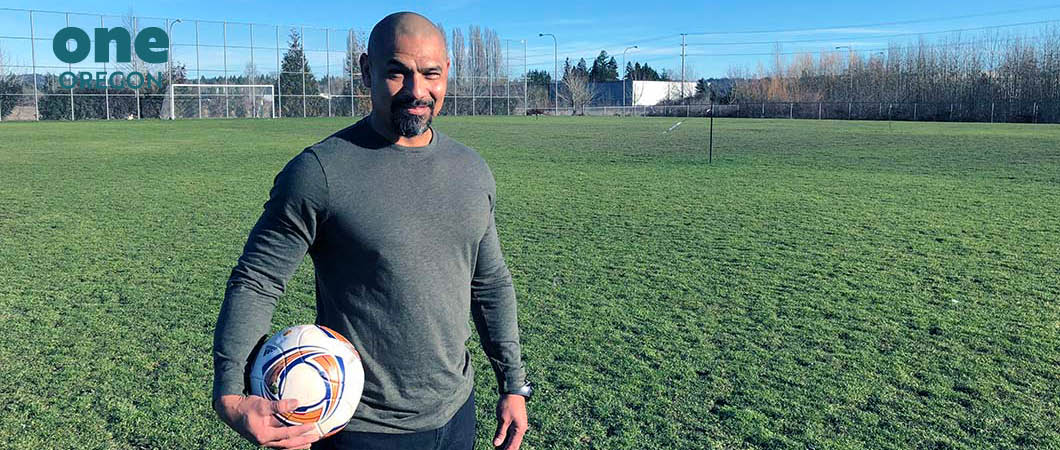Isidro Andrade-Tafolla was a star soccer player at Glencoe High School in Hillsboro during the late 1980s. His skills earned him a nomination to the All-America Team and received college scholarship offers.
Tragically, he was never able to pursue a college degree because his mother passed away before he graduated from high school, requiring him to help care for his younger siblings.
In his twenties, he was able to return to his soccer career and had a brief professional stint with the Portland Pride indoor team and a year with the Seattle Sounders.

Isidro was nominated to the All-America Team at Glencoe High School.
When his dreams of pro career ended, he returned to Oregon, where he led a quiet life working for Washington County’s maintenance department and coaching youth soccer. All that changed on September 18, 2017, when he and his wife, Renee, were racially profiled by federal immigration agents outside the Washington County Courthouse. Without identifying themselves, plain-clothes agents surrounded the couple as they were walking toward their truck. The agents demanded Isidro’s ID, giving no explanation as to why. They showed the couple a photo of a man who had no resemblance to Isidro except for his brown skin.
The incident was videotaped by ACLU legal observers, who were at the courthouse monitoring a protest against unethical tactics by Immigration and Customs Enforcement (ICE). Nearly every Portland news outlet reported on this incident.
Isidro was left feeling angry, humiliated and betrayed. He has been a United States citizen for 25 years and has worked at the county for two decades, dedicating his career to serving his community.
“I was really confused about what was happening,” Isidro said. “I later found out that they were following and targeting me and my wife. That made me feel horrible—no one should be put in a situation like that. I feel like the government betrayed me. Not only did they harass me—they didn’t even introduce themselves or say what they wanted, and they never apologized for their mistake.”

Isidro and his wife Renee
Isidro’s experience is part of a long history of federal agents unlawfully targeting brown and black people across Oregon. Racial profiling was commonplace in our state until Oregon lawmakers stepped in to stop the practice in 1987. They passed a law creating limits on how much local and state law enforcement officials can collaborate with the federal government in enforcing federal immigration laws.
Now a Salem-based non-profit, Oregonians for Immigration Reform, which has strong ties to white supremacist groups, is collecting signatures to place a measure on the 2018 ballot trying to repeal this 1987 law that has protected countless Oregonians from profiling.
Community leaders are deeply concerned that, if passed, this measure, known as Initiative Petition 22, would make racial profiling much worse than it is today.
“We are deeply concerned because there was a lot of discrimination before it passed,” said Ramon Ramirez, President of PCUN, a Woodburn-based group that advocates for farmworker rights. “The police didn’t know who was documented and undocumented or a U.S. citizen or a legal permanent resident. They were just pointing out where Latinos lived, and federal agents would go in and pull families out of their homes. They didn’t care that they were arresting U.S. citizens or taking kids from their parents. It reminded me of Nazi Germany, where Gestapo had free rein, trampling people’s rights.”
Isidro also is concerned.
“What happened to me should have never happened,” he said “It’s very wrong—they racially profiled me because of the color of my skin. This incident opened my eyes a little more, made me feel less secure. I just hope I don’t have to go through this again, and that no one else has to, either. It’s humiliating. If IP 22 passes, it will only get worse. It will tear families, friends, and communities apart. We should work to respect one another and build a stronger community, together.”
Drawn to the American Dream
Immigrants have been in Oregon for generations and are part of the fabric of the state. Like thousands before them, Isidro’s family was drawn to the American dream. His single mother came here seeking a better life for herself and her children. Through hard work and sacrifice, she was able to achieve this. He believes this dream is what drives most Latinos to come to America, and he sees people in the Latino community working very hard to establish a better life for themselves and their families.
“The American dream is one of the main reasons people come here from Mexico and other Hispanic countries,” he said. “Like others before us, we believe if we work hard we can build a better life, to have a better stability for ourselves and our families and to be a part of the community.”

Isidro coaches youth soccer teams in Washington County
Isidro and his siblings arrived in the United States undocumented. His mom was able to provide for the family by working two jobs. They spent their early years in California with family. It was there Isidro learned English in an ESL program at his elementary school. The family moved to Oregon in 1984, and Isidro and his siblings went to school and helped the family in the summer by working.
Isidro is a perfect example of why reforming our broken immigration is transformational. In 1987, he became a legal permanent resident after President Ronald Reagan signed the Immigration Reform and Control Act. Undocumented people, working in the United States, could gain legal permits by verifying their employment with the immigration services. His mother provided letters from his school and employer to help get a “Green Card.” Less than two years later, he was the first member in his family to graduate from high school.
Eight years later, while playing semi-pro soccer in Salem, Isidro received an extraordinary offer from the owner of his team. The owner would sponsor his citizenship application and pay thousands of dollars in legal fees to help him apply for citizenship. Isidro became a U.S. citizen in 1995.
“It was a great moment in my life,” Isidro said. “I’d worked so hard to be here, to do everything right—go to school, learn the language, work hard, support my family—and when I got my citizenship, I felt like I’d now have all the opportunities that other Americans have. It was a moment that I wish my parents could’ve seen. It’s hard to describe how proud I felt.”
Faith in Oregonians
Despite his experiences with federal immigration agents, Isidro remains hopeful, because he has a strong sense of community and connection to friends, colleagues, and neighbors.
“The community has been incredibly supportive of me throughout my life and in the aftermath of the incident with ICE,” he said. “I’ve felt welcome and safe in my community—at home, at work, throughout my 30-plus years in Oregon.”
Isidro and his family have stayed connected to Oregon’s Latino community, too, and he sees this diversity contributing to a richer, more vibrant state. “The Latino culture has a lot to offer this country,” Isidro said. “If this law passes, it would mean people would miss out on making new friends and being a part of a diverse and wonderful community.
“I have faith that Oregonians will see through this—this measure is trying to create hostility when what we need to do is be part of a community and treat everyone with respect,” Isidro said. “That’s what keeps our community strong.”
Take Action and reject racism and fear. Join One Oregon here.


Leave A Comment